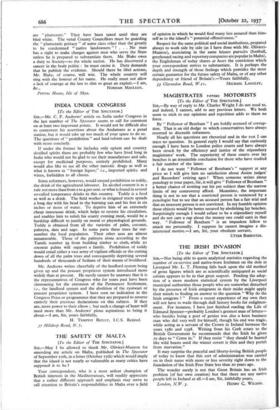INDIA UNDER CONGRESS
[To the Editor of THE SPECTATOR.] SIR,—Mr. C. F. Andrews' article on India under Congress in the last number of The Spectator seems to call for comment on at least two important points. It would not be difficult also to controvert his assertions about the Andamans as a penal station, but it would take up too much of your space to do so. The questions of " prohibition " and land reform can be dealt with more concisely.
If under the former he includes only opium and country distilled spirits there are probably few who have lived long in India who would not be glad to see their manufacture and sale, except for medicinal purposes, entirely prohibited. Many would also like to see all the other narcotic drugs as well as what is known as " foreign liquor," i.e., imported spirits and wines, forbidden to all classes.
Some reformers, however, would extend prohibition to toddy, the drink of the agricultural labourer. Its alcohol content is as a rule not more than from 2 to 4 per cent. or what is found in several so-called temperance drinks in this country. Toddy is a food as well as a drink. The field worker in irrigated tracts spends a long day with his head in the burning sun and his feet in six inches or more of water. To deprive him of an extremely cheap innocuous drink, which helps to restore his circulation, and enables him to relish his scanty evening meal, would be a hardship difficult to justify on moral or physiological grounds. Toddy is obtained from all the varieties of palm, coconut, palmyra, date and sago. In some parts these trees far out- number the local population. Their other uses are almost innumerable. Those of the palmyra alone according to the Tamils number 39 from building timber to cloth, while zo coconut palms will support a family. Prohibition of toddy would entail either a vast army of vigilant officials or the cutting down of all the palm trees and consequently depriving several hundreds of thousands of Indians of their means of livelihood.
Mr. Andrews writes cheerfully of the landlord system being given up and the peasant proprietor system introduced more widely than at present. He surely cannot be unaware that it is the representatives of Congress who for years past have been clamouring for the extension of the Permanent Settlement, i.e., the landlord system and the abolition of the ryotwari or peasant proprietor system. I have seen no indication in the Congress Press or programmes that they are prepared to reverse entirely their previous declarations on this subject. If they are, more power to their elbow ; but such a change of heart will need more than Mr. Andrews' pious aspirations to bring it about.—I am, Sir, yours faithfully, H. TEMPEST REILLY, I.C.S. Retired.
S7 Hilidrop Road, N. 7.






























































 Previous page
Previous page